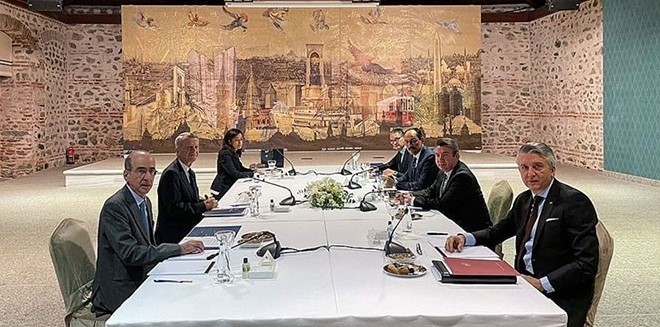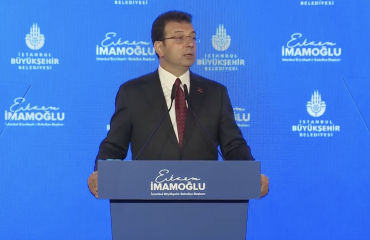

The 61st round of exploratory talks initiated to solve the Aegean issues between Turkey and Greece were held in Istanbul at the start of last week. The previous meeting had taken place in 2016 in Athens. Since then, Greece has not responded positively to Turkey’s calls for the resumption of exploratory talks. Greece has also declared that it would not launch dialog until Turkey stopped its drilling activities in the eastern Mediterranean. Greece rather preferred to take those issues to EU forums and managed to include its views in EU Council conclusions.
A brief history of exploratory talks
The bilateral talks between Turkey and Greece to settle the Aegean questions have a history of more than 50 years. But those talks have only been institutionalized by exploratory talks during the rapprochement process started by late Foreign Minister İsmail Cem and Giorgos Papandreou, his then-counterpart. It is not possible to claim that meaningful negotiations have taken place in all the exploratory talks since its first meeting on March 12, 2002. Some of the meetings must have taken place in a protocol manner just to keep the process alive. The contents of the exploratory talks are kept strictly confidential. Hence, it is not possible to know how much progress has been achieved in which meeting. However, taking into account the frequency of the meetings one can guess that serious ground has been covered in 2003-2004 and 2010-2011.
Maritime issues between Turkey and Greece
There are several interrelated issues in the Aegean Sea. To name a few, the breadth of the territorial sea and air space, the delimitation of the continental shelf and exclusive economic zones have always been on the agenda. Greece has constantly been in favor of extending its territorial waters to 12 miles based on the U.N. Convention on the Law of the Sea (UNCLOS). Since such a development would almost end the mobility of Turkish vessels in the Aegean, Turkey has prevented it by declaring casus belli in 1996. Violation of the demilitarized status of the Aegean islands and the sovereignty over small islands, rocks and geographical formations are other sources of dispute between the two countries.
Greece acknowledges only the presence of continental shelf among all those questions whereas all of them can be settled only as a package deal, not piece by piece. Due to the specific nature of the Aegean Sea, it is not possible to solve the continental shelf issue without reaching an agreement on territorial waters. An agreement on territorial waters will automatically solve the air space question, according to international law.
The Jan 25 meeting
The first visible difference at the Jan. 25 meeting was about the composition of the Turkish delegation. For the first time, a high-ranking official from the presidency was included in the delegation. Both the presence of İbrahim Kalın, the spokesperson of the presidency and the venue choice, the Presidential Office in Istanbul’s Dolmabahçe were viewed by both the Turkish and Greek media as indicators of the importance attached to the process by President Recep Tayyip Erdoğan. For the first time, a photo opportunity was granted to the press. The tradition of not issuing an official statement after the meeting continued. But spokesperson Kalın tweeted to express support for the process. The Greek side also observed the principle of secrecy. Prime Minister Kriyakos Mitsotakis told the press while receiving the French Defense that talks in Istanbul focused on the delimitation of maritime boundaries. The verb “to focus “ is important since it implicitly points to the possibility of discussions on other issues. It is yet to be seen whether it indicates an opening in Greek public statements.
International reactions to the talks
The Jan. 25 meeting was also well received in international arena. Ned Price, the spokesperson of the U.S. State Department, Heiko Maas, the German Foreign Minister, and Josep Borell, the high representative of the EU, all welcomed the resumption of the exploratory talks.
After an interval of 4.5 years, Greece has turned back to the table. The announcement of the next meeting to be held in Athens shows that the process will continue. According to the Greek press, it will take place by the end of February or early March.
The resumption of dialog between Turkey and Greece has also weakened the possibility of further sanctions on Turkey at the next EU council meetings. German Foreign Minister Maas publicly stated that additional sanctions would harm the dialog.
The forthcoming meeting of the two community leaders in Cyprus under the auspices of the U.N. has further strengthened Turkey’s hand.
International law and Libya
But how is it possible to solve the questions between Turkey and Greece?
We have the instruments in hand to solve all these questions some of which have been transferred to eastern Mediterranean.
The first and more healthy one is dialog and bilateral negotiations. Exploratory talks have served this purpose. It is not realistic to say that “We have solved the issue through our agreement with Libya and, Greece is not our counterpart in the eastern Mediterranean. In case of disagreement in the delimitation of maritime boundaries, international law foremost envisages dialog and bilateral talks. In order to implement the boundaries on the map submitted to the U.N. by Turkey on March 18, 2020, Greece should also be convinced to accept that.
The second instrument is to apply to international mechanisms. Within this context, the International Court of Justice is the first to come to one’s mind. For that matter, the two countries have to agree on which problematic matters would be taken to The Hague under which conditions. That also requires bilateral talks. Turkey has accepted not to exclude that option provided that all other means are exhausted and mutually agreed as early as 1996.
On the other hand, Greece has entered several reservations to that status of International Court of Justice as well as to the U.N. convention on the Law of the Sea dated 1982. It is doubtful that Greece will sincerely prefer the ICJ.
Turkey should not be the party to abandon the table
It is not worth even discussing the military option. There is no precedent of two allies fighting each other in the 70-year history of NATO. The international atmosphere does not allow such a war to take place. Under all these circumstances, there is no alternative other than to continue the exploratory talks without leaving the negotiation table.
It will not take much time to agree on a package deal the parameters of which are already known provided once political emerges on both sides.


